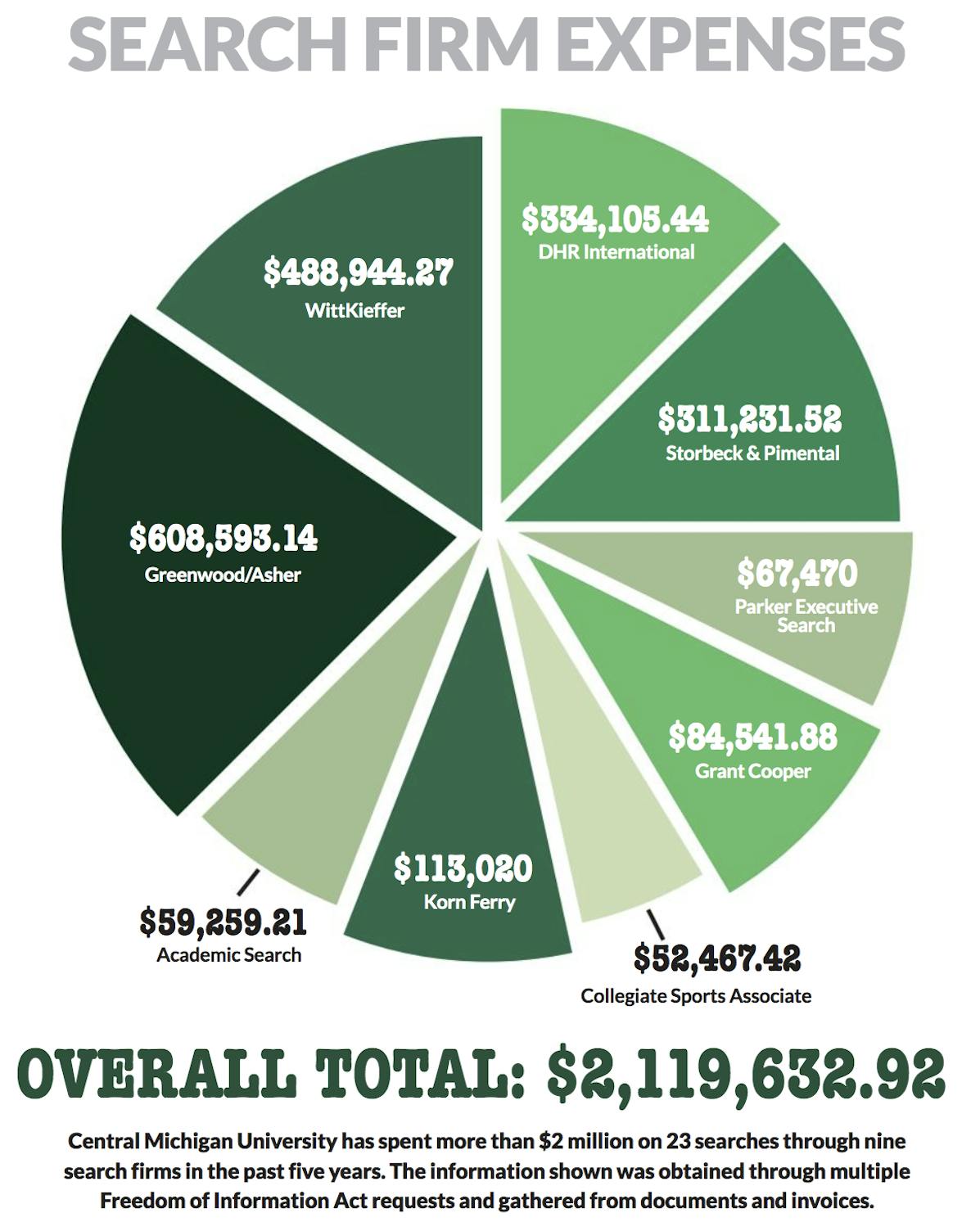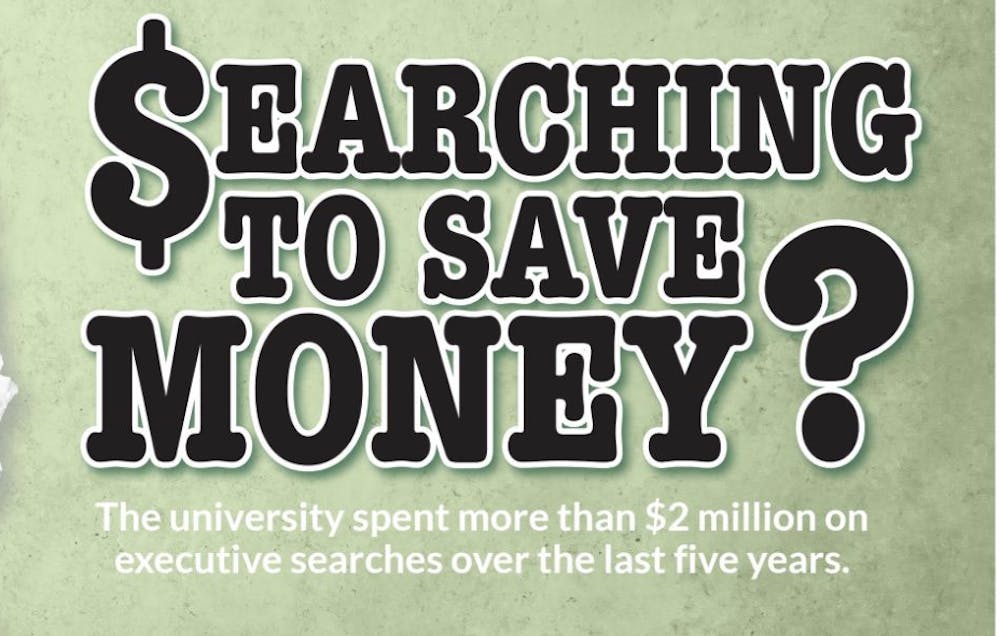CMU spends more than $2 million on executive searches in last 5 years
How CMU fills senior officer positions using professional search firms
For institutions like Central Michigan University, the process behind launching a national administrative search is far more complex than simply putting out a help-wanted advertisement.
Hiring a new administrator involves people, time and tens of thousands of dollars.
Central Michigan Life requested the payment invoices of all high-level administrative searches through the Freedom of Information Act. The information is based on the received documents.
Since Jan. 2015, CMU has conducted 23 administrative searches using nine different search firms, totaling more than $2 million. The average cost of each of these searches is about $92,000. Eight of them cost the university more than $100,000.
On Sept. 3, Central Michigan University launched another nationwide search for a new College of Science and Engineering Dean. Chris Moberg, the dean of the College of Business Administration, serves as the search committee chair but Greenwood Asher and Associates will identify the candidates who will be considered.
Search firms are specialized recruitment services that are paid by organizations to seek out qualified and experienced candidates for administrative roles. Firms bill the organization for various costs such as a professional fee, expenses, travel reimbursements and occasionally a percentage based on the salary offered to the candidate who is hired.
CMU’s most expensive search since 2015 was the $175,859 it paid to the firm WittKieffer which resulted in the hiring of President Bob Davies. The fee included $150,000 for professional services, $10,000 fixed overhead, $6,019 services rendered and $9,840 for actual expenses.
The search for university president was announced on Jan. 25, 2018 and ended Aug. 3, 2018.
Since Davies was hired in 2018, another 14 searches have been conducted by nine firms. These searches include the next two most expensive searches – the $125,000 search for the College of Business Administration Dean Chris Moberg and the $121,000 search for Executive Vice President and Provost Mary Schutten.
Using a search firm
Using a search firm is about “casting the widest net,” Schutten said. Bringing in personnel from other parts of the country can result in new ideas, more networking and increased diversity. There’s never a shortage of talent to choose from, either. At any given point, thousands of people are interested in senior leadership positions.

The university does not require that a search firm be used to fill every vacancy, according to the CMU Staff Hiring Process. However, Schutten said using search firms to fill most senior officer positions has become the standard.
“At least college dean level and above… those are default external searches,” Schutten said.
John Veilleux was recently hired as Vice President for University Communications and Chief Marketing Officer, using Greenwood/Asher and Associates firm costing CMU $117,373. He said he believes a university shows professionalism by employing a search firm. From an employee perspective, Veilleux explained that firms can help candidates prepare for interviews, understand the workplace culture of a university and provide insight into hot-button issues the institution is facing.
“I would not apply for a job if someone wasn't using a search firm. I just wouldn't,” Veilleux said. “One of the things the search firm does is help prepare the various talent pools that they're bringing in.”
Timeliness is another factor. The search for CMU head football coach John Bonamego took only 18 days after the departure of Dan Enos in 2015—others can take more than a semester. Bonamego was hired using the Collegiate Sports Associates firm which cost $52,467. Search firms are equipped to get a position filled faster than an internal search.
From a financial point of view, Schutten said search firms potentially save universities money because of decreased turnover rates. Candidates hired through a search firm are more likely to adapt to their new roles and stay at CMU for a longer tenure.
The 2017 search for the recently departed athletic director Michael Alford did not use a search firm. Vice President for Advancement Bob Martin chaired the search.
Martin stated the university saved $100,000 by appointing staff, faculty and student-athletes to the search committee instead of hiring a search firm that year. Alford only directed CMU athletics for three years.
Although no the invoices for the 2020 athletic director search are finalized, Schutten said she estimates the cost is the same as the search for Nick Long, vice president of financial and administrative services, which was about $91,300, since they were both through DHR International.
The search process

CMU's Manual of University Policies, Procedures and Guidelines: Search Firms outlines the process of using search firms.
Deciding to involve a firm falls upon the search committee, which is composed of administrators, faculty and the occasional student. Ultimate approval comes from the president, provost or a vice president.
Those who serve on a search committee are volunteers, Schutten said, and don’t have to accept the appointment. While they don't get compensated for serving on a search committee, some faculty and staff view an appointment as part of their service to the university.
After getting the go-ahead, the committee must choose one of the university-approved search firms or begin a bid process to involve a new one. Once a selection has been made, a work order outlining the responsibilities of the firm and committee must be completed with Human Resources.
The next step is for the committee and firm to meet with the Office of Civil Rights and Institutional Equity or Human Resources to educate them on conducting an inclusive search.
Either someone from the committee or Human Resources will act as the contact for the search firm. Together, the contact and the search firm will agree on a timeline.
This is when the search firm gets to business by narrowing down a handful of finalists for the committee to interview.
The chair of the search committee must receive approvals from Human Resources or OCRIE before interviewing candidates and again before an official offer is made. The firm is typically supposed to help negotiate the terms and conditions for CMU and the candidate when a job offer is made.
“The official offer of employment must be negotiated and finalized by CMU while keeping the search firm apprised of the situation,” the policy reads.
After someone has been hired, all that is left is paying the search firm.
Director of University Communications Heather Smith said "there is no centralized budget for administrative searches, the costs come from the department budgets for each search."
COVID-19's effect on searches
Smith and a part of the COVID-19 Emergency Management Team, said the group has discussed the safety aspects of interviewing job applicants throughout the pandemic.
Long was hired during the COVID-19 pandemic and said the hard part of the switch to a mostly remote process was being in “sell mode” and trying to make eye contact via video conferencing.
“You're having maybe five, six people in a room. (You) want to capture their attention, establish eye contact, work the room so to speak, but all through a computer,” Long said. “I’m bouncing all over the place. That becomes really hard to catch their attention. I'm not looking at the camera, which is my monitor.
"That was an interesting dynamic and kind of a weird one to figure out.”
Schutten said that with the way the university and search firms are conducting business remotely due to COVID-19, it may change how searches are conducted in the future. Some of those changes might make searches a little less expensive.
“I think COVID-19 is showing us a different way,” Schutten said. “One of the pros is that it reduced costs. There are travel costs when one flies in. So I suspect that it's shown us that we can do things a little bit differently."







